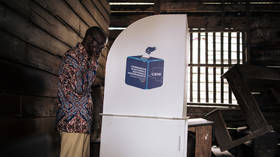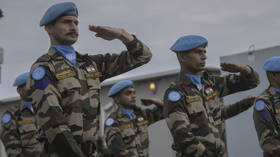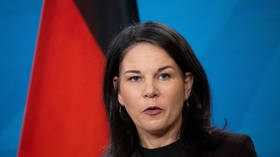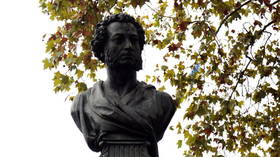Voting ends in conflict-torn African nation

The Democratic Republic of Congo wrapped up a previously unscheduled second day of voting in presidential and parliamentary elections on Thursday amid allegations of irregularities. The nation has been plagued by a protracted conflict with rebel factions in its eastern region.
Polling stations opened in the mineral-rich Central African nation on Wednesday for a single day of voting. However, logistical issues forced the authorities to extend the balloting for another day.
The first day of voting was hampered by delays in delivering election kits and malfunctioning equipment, while voters in some cases struggled to find their names on registers, according to local media. Violent incidents reportedly interrupted voting in other areas. The unscheduled extension could subject the results to legal disputes, according to some opposition candidates and observers.
While five of the 18 opposition candidates running against President Felix Tshisekedi have called for a rerun of the election, Moise Katumbi, a prominent businessman and former provincial governor considered the incumbent’s main rival, has not joined their demands.
Around 44 million people are registered to vote in the African nation, which, despite being the world’s third-largest copper producer, ranks as one of the five poorest countries in the world, according to the World Bank. DR Congo is also the world’s leading producer of cobalt, a critical component in batteries used in most consumer electronics, including mobile phones and electric vehicles.
Denis Kadima, president of the Independent National Electoral Commission (CENI), told reporters that about 70% of voters were able to cast ballots on Wednesday and that the extension would not affect the credibility of the vote. According to CENI, the preliminary results will begin to be released on Friday.
Election disputes have frequently sparked deadly unrest in the African country, which has a long history of conflict, political upheaval, and instability. This week’s vote could mark the second peaceful transition of rule in the country. DR Congo’s first peaceful transfer since its independence from Belgium 63 years ago occurred in 2019, when Tshisekedi, the winner of the December 2018 presidential election, was sworn in. Tshisekedi took over from Joseph Kabila, who had served for 18 years.
Tshisekedi, 60, has said he is seeking a second five-year term to “consolidate his gains.” He has accused neighboring Rwanda of funding the M23 rebel group, one of numerous militant coalitions he believes is responsible for destabilizing the country.
In his final campaign prior to Wednesday election, Tshisekedi told supporters that he had grown tired of “invasions and M23 rebels backed by Kigali.”
“If you re-elect me and Rwanda persists … I will request parliament and Congress to authorize a declaration of war. We will march on Kigali. Tell Kagame those days of playing games with Congolese leaders are over,” he said on Tuesday.
UN experts have also claimed that Kigali is arming M23 militants, whose resurgence in 2021 has increased violence in DR Congo’s volatile eastern region. The Rwandan government has repeatedly denied the allegations.
A UN peacekeeping mission in DR Congo that has been in place since 2010 is set to end next year after the government demanded its withdrawal due to alleged failures by troops to combat insecurity, particularly in the troubled North Kivu province.













